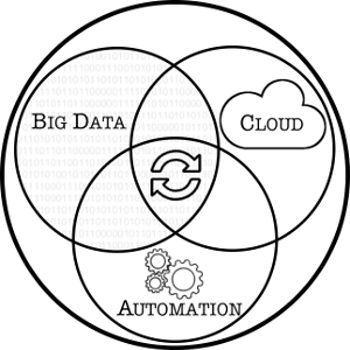webAI and MacStadium(link is external) announced a strategic partnership that will revolutionize the deployment of large-scale artificial intelligence models using Apple's cutting-edge silicon technology.
Regardless of the industry, we are finding these days all businesses are becoming data businesses. To keep up with competition, companies need to collect and analyze data, gain insight on that data and act on that insight.
That's easier said than done. At the moment, many companies can't keep up with their data, let alone their competition. That's not a technology problem; it's an employee skillset problem.
The proliferation of data and the pace of innovation within the open source software ecosystem are driving the convergence of Big Data, Cloud Computing, and DevOps/Automation. Proficiency across these functional areas is essential in this rapidly evolving, converging IT environment. At the moment, however, there's a lack of qualified talent with these cross-disciplinary skills.
To an extent, the emergence of DevOps itself has led to a skills imbalance across disciplines.
In the recession of 2007–2009, business cost cutting led to many technical efficiencies. This included the migration from waterfall to agile development – which created the need for DevOps, bridging software engineering, technology operations and quality assurance. DevOps, therefore, emerged as an active and growing skillset (DevOps is the convergence of software development, IT Operations and Quality Assurance). Many technologists immersed themselves in the skills related to DevOps.
In fact, though, DevOps is only a subset in the much larger convergence of technical skills needed in today's data-centric business environment.
Here's the real need:

The center of these overlapping circles is where the real action is. But it's also a real challenge.
Finding qualified candidates who can work with Big Data (Hadoop, NoSQL, Storm, Kafka, etc.) tools is very difficult. Understanding Cloud (AWS, Azure, Google, etc.) is just as hard. Those with experience with DevOps/Automation (Chef/Puppet/Ansible/Salt, etc.) is a little easier but nonetheless challenging.
And it's not enough to have a certification in certain technology skills. Certification and experience are not synonymous. Of course, certifications are a great prerequisite, and a start towards a true cross-disciplinary skillset, but certifications are not necessarily an indicator of real world experience.
■ In Big Data, what's important is having built a production Big Data system. What's not is something like Hadoop Certification (nice but not essential).
■ In Cloud Computing, what's important is being able to use SDKs and APIs, and to implement with best practices in your coding. What's not is something like AWS Certification (nice but not essential).
■ In DevOps/Automation, what's important is being able to work with full stack automation. What's not is working with software installation scripts (do we even need to explain why that's not important?)
It's quite uncommon to have a great developer come to the table with all three of these skill sets. Softer skills are often a good indicator of future capability. For example, when our company hires new technology talent, the most desirable traits among our qualified candidates are proven aptitude and motivation to learn.
As rare as it is to find people with the ability to work in today's converging technologies, it is still vitally important. Businesses with a shortage in these skills are definitely at a technical disadvantage compared with their better-heeled competitors.
For most companies, hiring individuals with these cross-disciplinary skills is not scalable. To level the playing field, businesses should create opportunities to gain these technology benefits.
Collaboration with integrators and consultants that have invested specifically in product and service offerings across the three disciplines of Big Data, Cloud and DevOps/Automation can go a long way to building real world capability in your own organization, without having to scale up in either internal cost or human resources.
Brad Kolarov is a Co-Founder and Managing Partner at B23.
Industry News
Development work on the Linux kernel — the core software that underpins the open source Linux operating system — has a new infrastructure partner in Akamai. The company's cloud computing service and content delivery network (CDN) will support kernel.org, the main distribution system for Linux kernel source code and the primary coordination vehicle for its global developer network.
Komodor announced a new approach to full-cycle drift management for Kubernetes, with new capabilities to automate the detection, investigation, and remediation of configuration drift—the gradual divergence of Kubernetes clusters from their intended state—helping organizations enforce consistency across large-scale, multi-cluster environments.
Red Hat announced the latest updates to Red Hat AI, its portfolio of products and services designed to help accelerate the development and deployment of AI solutions across the hybrid cloud.
CloudCasa by Catalogic announced the availability of the latest version of its CloudCasa software.
BrowserStack announced the launch of Private Devices, expanding its enterprise portfolio to address the specialized testing needs of organizations with stringent security requirements.
Chainguard announced Chainguard Libraries, a catalog of guarded language libraries for Java built securely from source on SLSA L2 infrastructure.
Cloudelligent attained Amazon Web Services (AWS) DevOps Competency status.
Platform9 formally launched the Platform9 Partner Program.
Cosmonic announced the launch of Cosmonic Control, a control plane for managing distributed applications across any cloud, any Kubernetes, any edge, or on premise and self-hosted deployment.
Oracle announced the general availability of Oracle Exadata Database Service on Exascale Infrastructure on Oracle Database@Azure(link sends e-mail).
Perforce Software announced its acquisition of Snowtrack.
Mirantis and Gcore announced an agreement to facilitate the deployment of artificial intelligence (AI) workloads.
Amplitude announced the rollout of Session Replay Everywhere.
Oracle announced the availability of Java 24, the latest version of the programming language and development platform. Java 24 (Oracle JDK 24) delivers thousands of improvements to help developers maximize productivity and drive innovation. In addition, enhancements to the platform's performance, stability, and security help organizations accelerate their business growth ...













